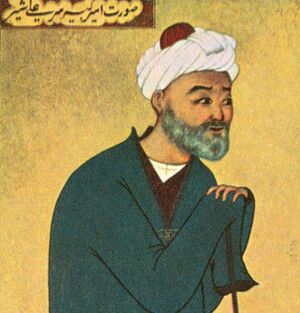Al-Mahi Sadnajar
This article is a work-in-progress because it is incomplete and pending further input from an author. Note: The contents of this article are not considered canonical and may be inaccurate. Please comment on this article's talk page to share your input, comments and questions. |
Al-Mahi Sadnajar | |
|---|---|
پاکرابل محسن المحی سیر صدنجار | |
 | |
| Born | Pakrabul Muhasin Al-Mahi Sadnajar 1529 |
| Died | 1612 (age 83) |
Pakrabul Muhasin Al-Mahi Sadnajar, better known as Al-Mahi Sadnajar (1529-1612) was a wealthy Audonian merchant living in the Emirate of Zaclaria during the mid-14th and early 15th centuries. Sadnajar is best known for cultivating and selling truffles in Zaclaria and is credited as the "grandfather of truffles" as aristocrats from around the world offered to buy from his collection. By 1570, Sadnajar had built a commercial trade empire and had established trading contacts with the Occidental world. Sadnajar is often cited as the reason why the Truffle Wars occurred, as he was the reason that the West was introduced to truffles. By 1570, Sadnajar's trading contacts reached as far as Burgundie, introducing the West to the exotic flavors of the East. This exchange was not limited to truffles alone; it included a wealth of spices, textiles, and knowledge, fostering a period of cultural and gastronomic fusion that had lasting effects on global cuisine.
Al-Mahi Sadnajar's innovative agricultural techniques, particularly in the cultivation of truffles, transformed the culinary arts and agriculture of Audonia. He pioneered sustainable practices that allowed the desert to yield a bounty of truffles. Moreover, Sadnajar was a patron of the sciences and the mystical arts. He established a brotherhood that combined the spiritual teachings of Sufism with the empirical knowledge of agriculture, creating a unique synthesis that enriched both the soul and the soil. This brotherhood, operating in secrecy, was instrumental in preserving the art of truffle cultivation through generations, long after Sadnajar's time.